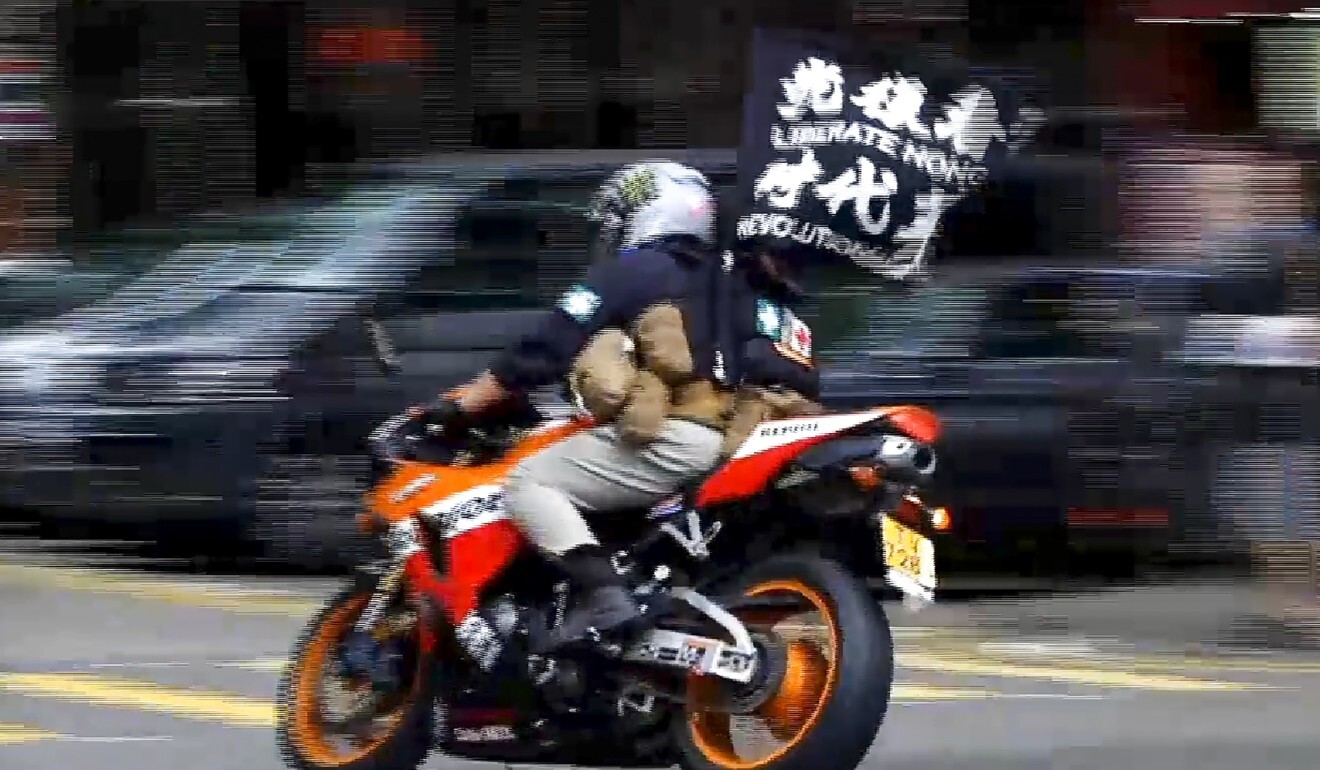
National security law: scholars, legal experts warn ‘Liberate Hong Kong’ slogan ‘very risky’ in wake of secession conviction
- Ruling on popular protest slogan has broad implications for future trials, analysts say, amid debate on possibility of terrorism charge
- Human rights advocates fear a chilling effect on free speech, arguing ruling leaves residents wondering ‘where the boundary is’
Scholars also argued that a criminal act was only connected to terrorism if the violent behaviour was committed in pursuit of a political agenda.
Eight Chinese characters that have the Hong Kong government worried
One of the key issues in the trial had been Tong’s display of a banner carrying the slogan “Liberate Hong Kong; revolution of our times” – popularised during the 2019 social unrest – when he rammed into police officers on his motorcycle.

The former restaurant worker had also caused great harm to society by inflicting grave injuries on the three police officers who had tried to block him after he ignored repeated warnings to stop, they ruled. Tong could face a maximum punishment of life imprisonment.
At the heart of the trial was the interpretation of the slogan, which was spray-painted on walls and chanted regularly during the 2019 protests. The verdict was closely watched for indications as to how similar cases would be dealt with in future.
No matter if it’s a key chain, or a leaflet, if a person has an intention to pass on the pro-independence message and incite others, then he or she could have violated the law
Justice Esther Toh Lye-ping on Tuesday agreed the slogan was capable of inciting others to commit secession “having regard to the natural and reasonable effect of displaying the flag” and “in the particular circumstances of the case”.
Reading the summary of the judgment, Toh said that by displaying the slogan in the manner he did, the defendant intended to communicate its secessionist meaning to others and to incite others to commit secession by separating Hong Kong from the People’s Republic of China.
University of Hong Kong (HKU) legal scholar Albert Chen Hung-yee said the judgment combined the incitement element from the common law system, and the secession offence under the security legislation.
Chen, a member of the Basic Law Committee, said the court had determined the slogan was capable of meaning advocacy for Hong Kong independence, but the defendant’s guilt depended on whether he intended this message to carry the message of secession.
“In other cases, defendants, if prosecuted, will have to defend themselves by explaining how they used the slogan and why it was not intended to mean secession,” he said, adding that newspaper articles or speech directed at members of the public might constitute incitement to secession if Hong Kong independence was indeed being advocated.
First person tried under Hong Kong national security law guilty of secession, terrorism
Executive Council member Ronny Tong Ka-wah, a barrister by profession, said it would be “very risky” to display or shout the slogan publicly in future, as it had now been linked with secession in a legal ruling.
“No matter if it’s a key chain, or a leaflet, if a person has an intention to pass on the pro-independence message and incite others, then he or she could have violated the law,” he said. “To avoid getting into trouble, it’s better not to carry these items.”

Echoing Tong, barrister Anson Wong Yu-yat said that while judges would determine each case individually, the first trial had established a ruling that the slogan carried pro-independence and secessionist meanings.
“I think most Hongkongers know the slogan is problematic. It is true that when it comes to a trial, the court will still determine a case based on circumstances and context, but since the slogan is now deemed illegal in this case, the public should avoid using it to reduce suspicion,” he said.
However, criminal lawyer Andrew Powner argued that uttering the slogan on its own did not automatically violate the national security law, as the ruling was ambiguous and not definitive on this question. What appeared to be critical, however, were the circumstances in which the phrase was used, he said.
It’s a slippery slope and it’s vague, and that concept is contrary to what we would understand the rule of law to be
If someone was selling a key chain with the slogan at a Lunar New Year fair, for example, that might indicate political intent if other anti-government paraphernalia was also on offer, whereas simple possession on the street still might not be regarded as breaching the law, argued Powner, managing partner of Haldanes, the city’s largest criminal law firm.
However, he said “a cautious approach would be not to use it”.
Professor Song Sio-chong, of Shenzhen University’s Centre for Basic Laws of Hong Kong and Macau, said the case would have far-reaching implications as a reference for future ones.
Three out of 65 defendants awaiting trial for security law offences are facing secession charges, with at least one charged over his use of the slogan.
‘Liberate Hong Kong’ chant may not break security law, lawyers say
The case also proved to the public that slogans such as “five demands, not one less” – a chant heard throughout the months of unrest calling for, among others, an inquiry into alleged police brutality and an amnesty for arrested protesters – could be problematic as well if they challenged the central and Hong Kong governments to admit “mistakes”, Song said.
Liberal academics called the verdict another blow to freedom of expression.
Michael Davis, a former professor of human rights law at HKU, said ordinary people who were engaged in political activities could fear their speech was not protected, and that conveying opposing views raised the risk of more serious charges.
’Liberate Hong Kong’ can have multiple meanings, but is it ultimately a call for secession?
While the ruling focused on inciting secession, Davis said free speech principles were not addressed.
“There is a concern because people won’t know where the boundary is,” he said.
Human rights lawyer Mark Daly said the judgment was going to have an immediate chilling effect in which no one was going to run the risk of displaying or chanting the slogan, despite the fact that it had not been officially made illegal.
“It’s a slippery slope and it’s vague, and that concept is contrary to what we would understand the rule of law to be, especially when there are such serious consequences.”
Daly said the ruling had wider implications for political speech in Hong Kong.
“From a human rights law perspective, people should be able to make political speeches, and so the balance here doesn’t seem to be right in the sense that it is going to have a chilling effect because of the vague nature of the law, and now we see the concrete way it’s being applied,” he said.
The judgment also sparked a debate among legal scholars as to whether activities that seriously jeopardised public safety or security would lead to terrorism charges.
Chen, the HKU law professor, said the intent of the security legislation was to make a violent act which would already be in breach of criminal law an act of terrorism if there was a political agenda.
“This is consistent with the internationally accepted understanding of terrorism – whether the act is committed with a political agenda in mind and to intimidate members of the public or to coerce the government into accepting a political demand depends on the facts and circumstances of the case,” he said.
Unpacking the Hong Kong protests factor in Taiwan’s election
Wong, who practises both criminal and public law, said Tong’s case was special, as the secession element was intertwined with terrorism, which the court ruled the defendant had carried out with a view to intimidating the public to pursue his political agenda while causing harm to society.
“There are quite a few conviction elements. If it was just an individual act of attacking police, without pursuing a political agenda or secession, then the defendant might not be found guilty of terrorism,” he added.
Former director of public prosecutions Grenville Cross said this first case clearly had a major impact, as it showed how a fair trial, with all the basic guarantees necessary to safeguard a defendant, could be conducted under the national security law.
The academics all believed the defendant was likely to appeal the verdict, where he could still argue whether there was misquoted or new key evidence, as well as whether a higher court would define circumstances in which the use of the slogan was acceptable.


